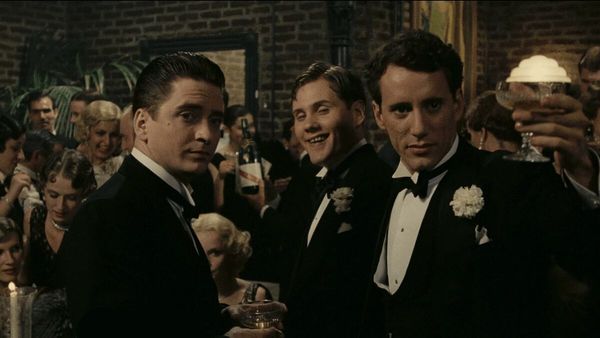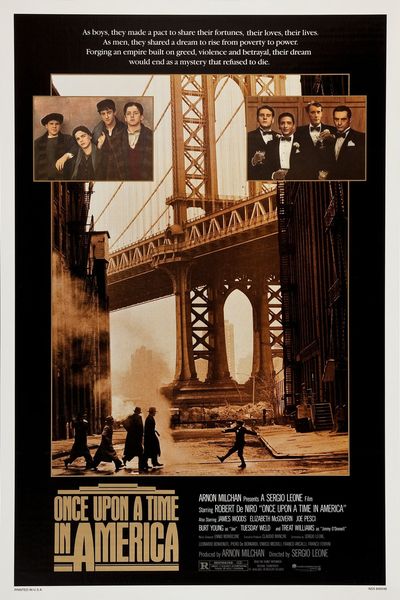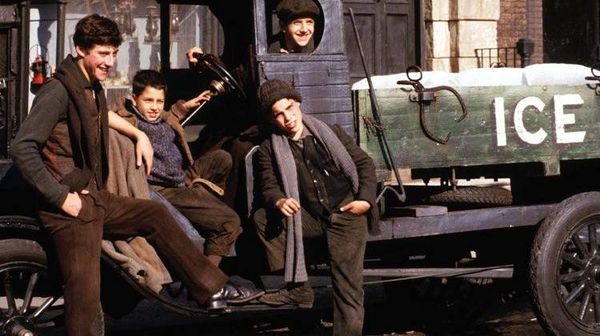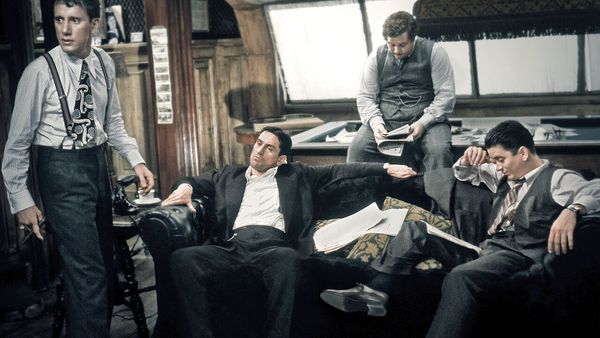Once Upon a Time in America (1984)

“Once Upon a Time in America” (1984): A Masterful Epic Directed by Sergio Leone
Released in 1984, “Once Upon a Time in America” is an epic crime drama directed by the legendary Sergio Leone, known for his iconic spaghetti westerns. This film stands as a testament to Leone’s cinematic vision, offering a sprawling narrative that spans several decades and explores themes of friendship, betrayal, and the harsh realities of the American Dream. With its rich storytelling, stunning cinematography, and a haunting score by Ennio Morricone, “Once Upon a Time in America” is regarded as one of the greatest films in cinema history, despite its initial mixed reception.
Set against the backdrop of New York City from the early 1900s to the 1960s, the film follows the life of David “Noodles” Aaronson (Robert De Niro), a Jewish gangster who returns to his old neighborhood after years of exile. The narrative unfolds through a series of flashbacks, revealing Noodles’s childhood friendship with a group of fellow gangsters, including Max Bercovicz (James Woods). As they navigate the criminal underworld, their lives become intertwined with love, ambition, and betrayal, ultimately leading to tragic consequences. The film’s non-linear structure adds complexity, inviting viewers to piece together the fragmented memories of Noodles as he grapples with his past.

Sergio Leone’s direction is characterized by his meticulous attention to detail and a strong visual style. The film’s cinematography, masterfully executed by Tonino Delli Colli, captures the gritty realism of early 20th-century America while also employing sweeping, poetic imagery. Leone’s use of long takes and close-ups creates an immersive experience, allowing audiences to connect deeply with the characters and their emotional journeys. The pacing, although deliberate, builds tension and anticipation, drawing viewers into the characters’ lives and the consequences of their choices.

“Once Upon a Time in America” is primarily classified as a crime drama, but it also incorporates elements of historical epic and psychological exploration. The film delves into themes of nostalgia, loss, and the moral ambiguities of a life lived on the fringes of society. As Noodles reflects on his past, the narrative prompts viewers to consider the costs of ambition and the fleeting nature of happiness. The portrayal of friendship and betrayal adds emotional depth, highlighting the complexities of human relationships amidst the brutal realities of their environment.

The performances in “Once Upon a Time in America” are exceptional, with Robert De Niro delivering a poignant portrayal of Noodles. De Niro captures the character’s evolution from a hopeful young man to a disillusioned adult, conveying a sense of longing and regret. James Woods shines as Max, bringing charisma and intensity to a character whose ambition ultimately leads to tragedy. The supporting cast, including Elizabeth McGovern and Joe Pesci, enriches the narrative, adding layers to the story’s emotional and moral dilemmas.

Upon its release, “Once Upon a Time in America” faced mixed reviews, with some critics praising its ambition and visual style, while others found its length and structure challenging. However, over the years, the film has gained recognition as a masterpiece, celebrated for its storytelling and technical achievements. It has since become a significant work in Leone’s filmography and a classic in the crime genre.
In conclusion, “Once Upon a Time in America” is a monumental film that showcases Sergio Leone’s directorial genius and the extraordinary talents of its cast. With its intricate narrative, breathtaking visuals, and profound themes, the film offers a compelling exploration of friendship, ambition, and the American Dream’s complexities. As it weaves together the threads of nostalgia and loss, “Once Upon a Time in America” stands as a timeless classic, inviting viewers to reflect on the passage of time and the choices that define a life.











